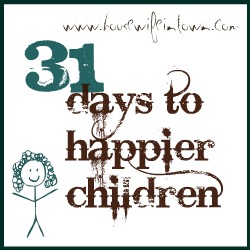Don't Play With Your Child
This is a teaser post -- similar to what the 31 Days to Happier Children posts will be like. You won't want to miss them. ;)
Come back every day during the month of October for more discussion about parenting happy children. Hope you'll join me!
-----------
Don't play with your child.
I know. You're looking at me funny now, aren't you?
Did I just say don't play with your child? Isn't that counter-culture to what mothers are supposed do? Aren't mothers supposed to be the all-time-around-the-clock-best-playmate-ever?
I woke up one morning, early, knowing there was a brand new little person in the bassinet next to me, sound asleep, making those beautifully soothing newborn noises, and I felt just AMAZING. Like someone had handed me the world -- everything that had potential to be a wanted thing in life -- I had it sleeping next to me. Love sick. Drunk with love. I had a baby.
And I played with that dreamy little person every moment its eyes were open. And sometimes when they weren't. Those soft little sleepy cheeks needed to be caressed, right?
Aaaaah. Newborn love. I saved all the dishes and sweeping and even my own personal hygiene for when baby was asleep -- why waste a minute of cuddles?
Well -- needless to say, the feeling wore off. Somewhere in between a LOT of poopy diapers and a significant amount of lost sleep, probably right after I decided to let him cry his sorry self to sleep and sat on the floor outside his door crying my eyes out too.
But this article isn't about losing that first love.
It's about letting your child play alone. It's about letting them learn from challenges. It's about encouraging them to develop their own independent style. It's about growing up.
And as totally amazing and wonderful as that baby stage was, growing up is good too.
I came into parenthood thinking that I needed to be present and engaged with my child every minute that he was awake. That it was my job to entertain and participate in all his daily childhood play endeavors. Losing nap time about three years later threw a wrench in my plans and made me feel very exhausted and overwhelmed. And guilty. Now I was folding laundry instead of playing with trains. I was cooking dinner instead of tossing a ball back and forth. {Looking back, I'm surprised I made it three years.} Seriously. Moms have needs too.
But this article isn't about making sure mom's needs get met.
This article is about putting mommy guilt aside and training your child to play alone. For their sake.
They need to learn how to self-entertain. An important life skill, especially in such an entertainment-driven society.
They need to learn to be a leader, to learn to direct things, to learn to work with other people, without your constant presence and guidance. On their own.
They need opportunities to be creative -- to create their own play options, to devise their own story lines.
They need to develop resourcefulness. Unstructured play = resourceful child = adult with initiative.
Rae Pica, in her book "A Running Start: How Play, Physical Activity and Free Time Create a Successful Child", talks about the benefits of independent [of the parent] play:
"When kids play on their own, they learn to solve their own problems, negotiate, resolve conflicts and figure things out. They experiment, take calculated risks, and test themselves. They are free to discover their weaknesses, as well as their strengths, and to determine what matters enough to continue working at. [...] If you refrain from "fixing" everything for him...he'll learn to be self-directed. Moreover, he'll be willing to try and try again. He'll become resilient."
Moms naturally want to protect and coddle their children. They want to do everything for them, be their biggest fan. But we can take it too far and actually cause more harm than good.
Like Lenore Skenazy says in her post, "Don't we want to raise kids who can figure out something to do when they're bored?"
Yes. And we want them to develop social skills and problem solving skills and CONFIDENCE from finding solutions and positive outcomes ON THEIR OWN.
In this video, Christine Carter, author of Raising Happiness and blogger at Greater Good, discusses play and its benefits. She supports the idea that children need to learn to go off and play by themselves or with their friends -- no need to hover. :)
My four year old has become really really good at independent play. And I see how it benefits him. My two year old is in the training phase -- still pretty clingy.
And I'm slowing losing the guilt and enjoying a bit of down time here and there while they play happily together in the backyard. My babies. Who sometimes still need their sleepy cheeks caressed.
